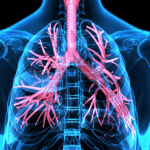Congenital Heart Disease and Extracardiac Phenotypes Associated With Novel Pathogenic Variant in GATA6
Congenital Heart Disease and Extracardiac Phenotypes Associated With Novel Pathogenic Variant in GATA6 https://pediatricsnationwide.org/wp-content/uploads/2022/07/AdobeStock_134232290-DNA-header-1024x575-1.gif 1024 575 Jessica Nye, PhD Jessica Nye, PhD https://secure.gravatar.com/avatar/?s=96&d=mm&r=g- October 30, 2023
- Jessica Nye, PhD

A study published in Pediatric Research describes a novel pathogenic variant in the gene GATA binding protein 6 (GATA6) associated with congenital heart disease (CHD), diabetes mellitus and necrotizing enterocolitis.
GATA is a family of transcription factors that encode zinc finger DNA binding proteins which are critical regulators during organogenesis. Pathogenic variants in three of its family members have been linked with birth defects of the heart and digestive system.
“At Nationwide Children’s Hospital we have an ongoing genetic research study, where we’re actively looking to discover novel genetic causes of CHD,” says Vidu Garg, MD, director of the Center for Cardiovascular Research and pediatric cardiologist in The Heart Center at Nationwide Children’s Hospital, and a professor in the Department of Pediatrics and the Department of Molecular Genetics at The Ohio State University.
“We identified a family where several family members were affected with CHD” explains Dr. Garg.
In this family, the father had persistent truncus arteriosus (PTA) and childhood-onset diabetes mellitus and among his four children, three were also affected by CHD.
The major heart defects in his children included PTA and interrupted aortic arch in a daughter while a second daughter had an atrial septal defect (ASD), left pulmonary artery stenosis, patent ductus arteriosus, and bicuspid aortic valve. The third daughter was born with PTA, ASD and mild hypoplasia of tricuspid valve and right ventricle. The third affected daughter also developed the noncardiac disease, necrotizing enterocolitis with intestinal perforation.
In the study, the affected father, the three affected daughters, the unaffected son and the two unaffected paternal grandparents provided samples for genetic testing. The investigators performed exome sequencing at the Institute for Genomic Medicine at Nationwide Children’s to search for a potential pathogenic variant along with molecular assays to understand its biochemical deficits.
A single heterozygous missense variant in GATA6 (NM_005257.5: c.1403 G>A; p.Cys468Tyr) was identified among the affected family members that was not present among the unaffected family members.
“Interestingly, the types of congenital heart defects that we found in the family matched with other published reports of GATA6 mutations, which are also associated with type I diabetes. A novel observation within this family, was the patient who had an intestinal disease, necrotizing enterocolitis, which we think may also be related to the GATA6 mutation,” says Dr. Garg.
In vitro functional analyses indicated that cells with the pathogenic variant had abnormal protein aggregate localization in the nucleus compared with wild-type cells, and that the mutant protein had decreased expression and a limited ability to activate downstream genes when compared with normal GATA6.
“If you have a family with multiple members who have CHD, genetic testing should be offered in consultation with our clinical cardiovascular genetics team, if the family is interested,” says Dr. Garg. “Further, if you are caring for a patient with CHD, who has an additional disease, such as type I diabetes or intestinal necrotizing enterocolitis, it may be reason to consider a genetic etiology, specifically GATA6.”
Reference
Yasuhara J, Manivannan SN, Majumadar U, Gordon DM, Lawrence PJ, Aljuhani M, Myers K, Stiver C, Bigelow AM, Galantowicz M, Yamagishi H, McBride KL, White P, Garg V. Novel pathogenic GATA6 variant associated with congenital heart disease, diabetes mellitus and necrotizing enterocolitis. Pediatr Res. 12 Sept 2023 [Epub online].
About the author
Jessica Nye, PhD, is a freelance science and medical writer based in Barcelona, Spain. She completed her BS in biology and chemistry and MS in evolutionary biology at Florida State University. Dr. Nye studied population genetics for her doctorate in biomedicine at University of Pompeu Fabra. She conducted her postdoctoral research on the inheritance of complex traits at the Autonomous University of Barcelona.
-
Jessica Nye, PhDhttps://pediatricsnationwide.org/author/jessica-nye-phd/
-
Jessica Nye, PhDhttps://pediatricsnationwide.org/author/jessica-nye-phd/
-
Jessica Nye, PhDhttps://pediatricsnationwide.org/author/jessica-nye-phd/January 3, 2022
-
Jessica Nye, PhDhttps://pediatricsnationwide.org/author/jessica-nye-phd/
- Posted In:
- Clinical Updates
- In Brief
- Research










